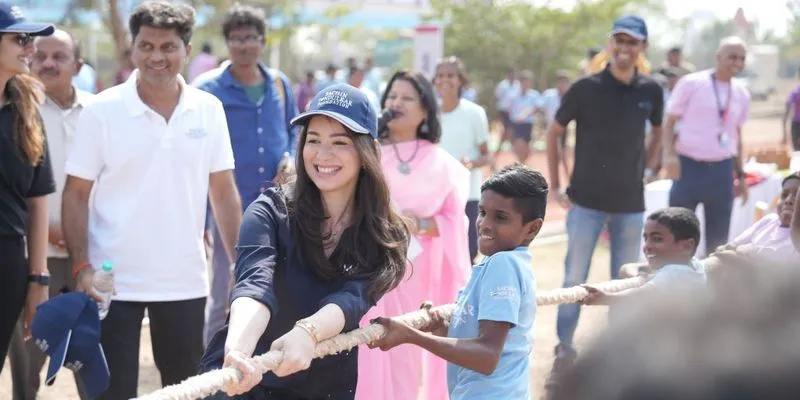How Sara Tendulkar is driving social change through Sachin Tendulkar Foundation
Sara Tendulkar, Director of the Sachin Tendulkar Foundation, outlines the organisation’s key initiatives and her vision to scale its impact.
Growing up, Sara Tendulkar remembers her grandmother, Annabel Mehta, deeply involved in non-profit Apnalaya, working to better the lives of underprivileged children in Mumbai.
As a child, Sara would accompany her grandmother to Children’s Day events and marathons, keenly aware of the differences and her own privilege.

Sara Tendulkar
In 2019, her father, cricket legend Sachin Tendulkar, and her mother, Dr Anjali Tendulkar, started the Sachin Tendulkar Foundation (STF) to empower underprivileged children through sports, health, and education.
So far, over 1.1 lakh children have benefitted from various initiatives across 15 states. STF has partnered with over 14 NGOs to create long-term measurable impact. These include Hi5, SR10 Global Academy, Yuwa, Manndeshi, and Shreeja for sport; Ekam, SRCC, Inga, Makunda, Sai Aashraya, and Parivaar for healthcare; and VVY, Parivaar, and SHIF for education.
Recently, Sara officially joined the Sachin Tendulkar Foundation as a director. Sara, who holds an MA in Clinical and Public Health Nutrition from University College London, and will work to drive impactful changes in healthcare, sports, and education across India.
In an interview with SocialStory, Sara Tendulkar outlines the STF’s focus on sports, healthcare, and education, and speaks of carrying forward the philanthropic legacy of her family.
Edited excerpts:
SocialStory (SS): The Sachin Tendulkar Foundation (STF) was launched in 2019. What inspired its creation?
Sara Tendulkar (ST): My family has always believed in giving back to society. My grandmother, after moving to India from the UK, dedicated her life to Apnalaya, an NGO focused on supporting underprivileged children. My mother, a pediatrician, has always prioritised children’s healthcare. My father has always believed in giving back to society.
For years, my parents were involved in various charitable initiatives, but they realised that a structured approach would create greater impact. In 2019, they officially launched STF to ensure that their philanthropic work was strategic, sustainable, and far-reaching.
At its heart, STF is about creating opportunities for children across India—giving them access to quality education, healthcare, and sports so they can lead better and more fulfilling lives.
SS: STF focuses on sports, healthcare, and education. Why were these three areas chosen?
ST: The foundation’s pillars are deeply rooted in our family’s values. My father has always believed that every child should have access to sports.
My mother, as a pediatrician, has seen how early medical intervention can transform a child’s future. My grandfather, a professor, always emphasised that education is the foundation of empowerment. These values resonate with the family, and naturally became the core pillars of STF.
SS: What are some key projects STF is working on right now?
ST: We have partnered with 14 NGOs across 15+ states, focusing on projects that create long-term, measurable impact. Some of our most significant initiatives include:
1. Healthcare Initiatives:
- Mother & Child Nutrition Programme:
- We focus on the first 1,000 days of a child’s life—from conception to infancy—to ensure proper nutrition, immunization, and holistic development. Through this programme, we help mothers and children in underserved communities access the nutrition and medical support they need.
- Cleft Lip & Palate Surgeries:
- Many children with cleft lip deformities face social stigma and isolation.
- STF partners with hospitals and surgeons to provide free reconstructive surgeries, giving children a chance to smile, speak, and integrate into society with confidence.
2. Sports Initiatives:
- Football & Basketball Programmes:
- We run training programmes in multiple states, particularly focusing on tribal and marginalised youth.
3. Education Initiatives:
- Scholarships & Mentorship Programmes:
- Many bright students lack financial support to pursue higher education.
- STF provides scholarships and mentorship to help students get into good colleges and meaningful careers.
SS: How does STF decide which communities to support?
ST: The need in India is huge. We focus on the underserved and marginalised, such as tribal populations and remote rural areas that are overlooked by larger organisations, and where they are hesitant to intervene. We look at places in critical need of support–where children lack basic healthcare, sports or access to education.
For example, we work with tribal girls through a football programme, ensuring they develop confidence and life skills alongside athletic training.
SS: Can you share a moment that personally impacted you since joining STF?
ST: Two experiences stand out. I visited a hospital in Kashmir where I met children undergoing cleft lip surgeries. Seeing their before-and-after transformation was life-changing. I met parents who were grateful and relieved that their child could now speak, smile, and interact with confidence. It made me realise how a simple surgery can change a child’s entire future. In another experience, I met women healthcare workers in rural Udaipur. Women wearing ghoonghats (veil) were fearlessly leading community health initiatives. Their confidence, knowledge, and leadership were inspiring.
These experiences showed me that every effort counts, and even small changes can create a life-long impact.
SS: What are your personal goals as Director of STF?
ST: I want to integrate sports, healthcare, and education into a holistic model. For instance, a child in our sports programme should also receive proper nutrition and healthcare support. We also want to focus on sports for development because when a child gains confidence through sports, it ripples through their family and community—encouraging education, breaking gender barriers, and fostering a growth mindset.
SS: Your parents are deeply involved in philanthropy. What lessons have you learned from them?
ST: From my father I learned how to prioritise. Despite his busy schedule, he makes time for field visits, interacting with children and their parents and attending sports ceremonies to give away medals.
From my mother, I have learned to pay attention to detail. She is meticulous in everything she does. She is very much a Type A doctor, and always asks the right questions.
SS: What message do you have for young people who want to contribute to social change?
ST: My focus would be on raising awareness among the younger generation, and hopefully, inspiring them to contribute more. You don’t need to donate money to make a difference. You can volunteer your time, effort and skills in helping others, even if it’s just one child.
Edited by Megha Reddy






